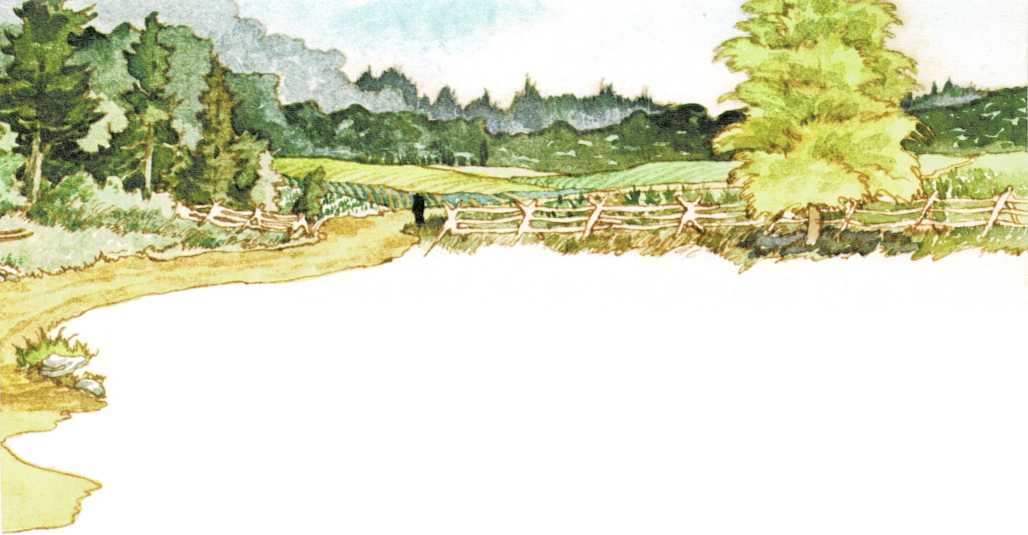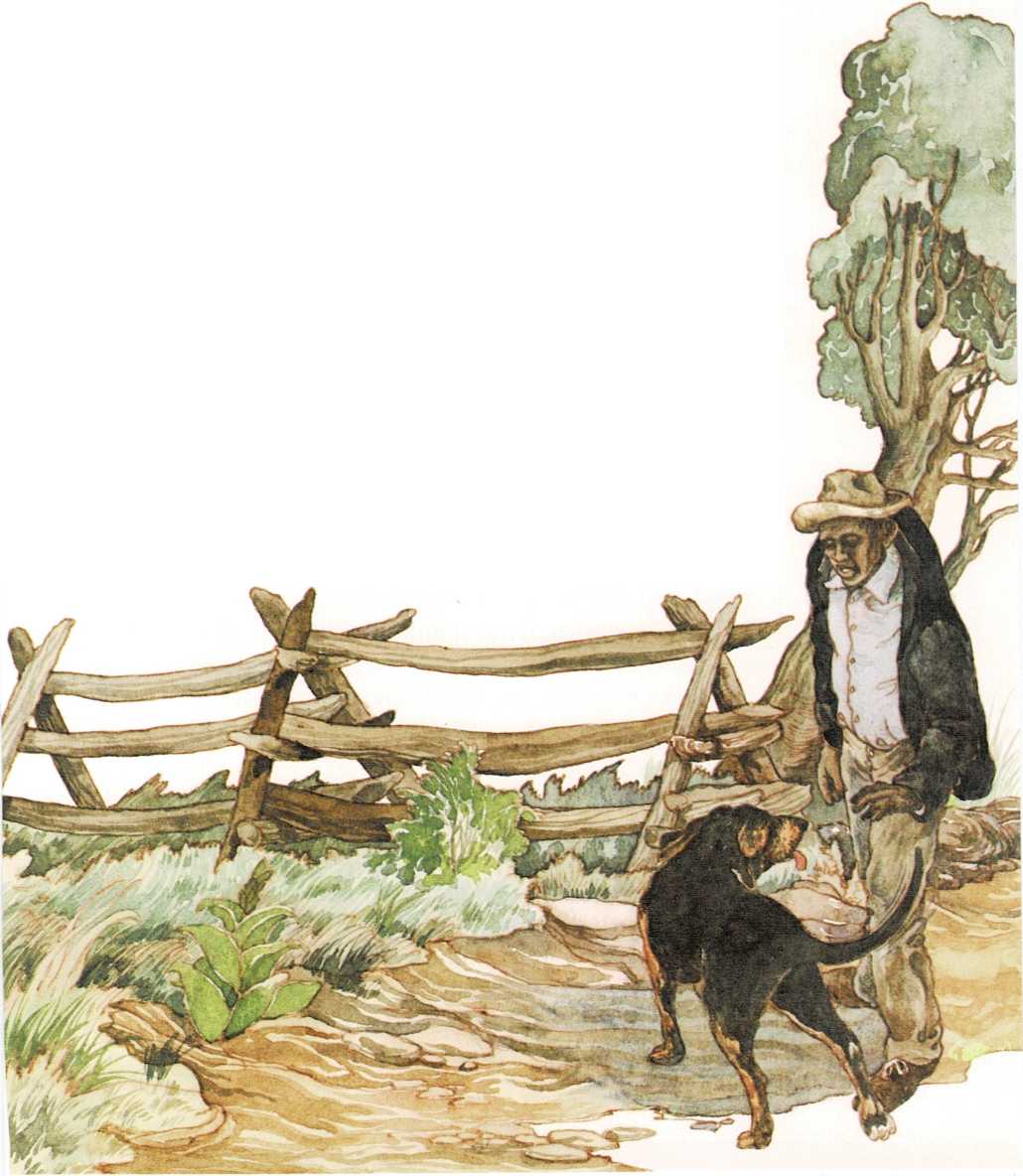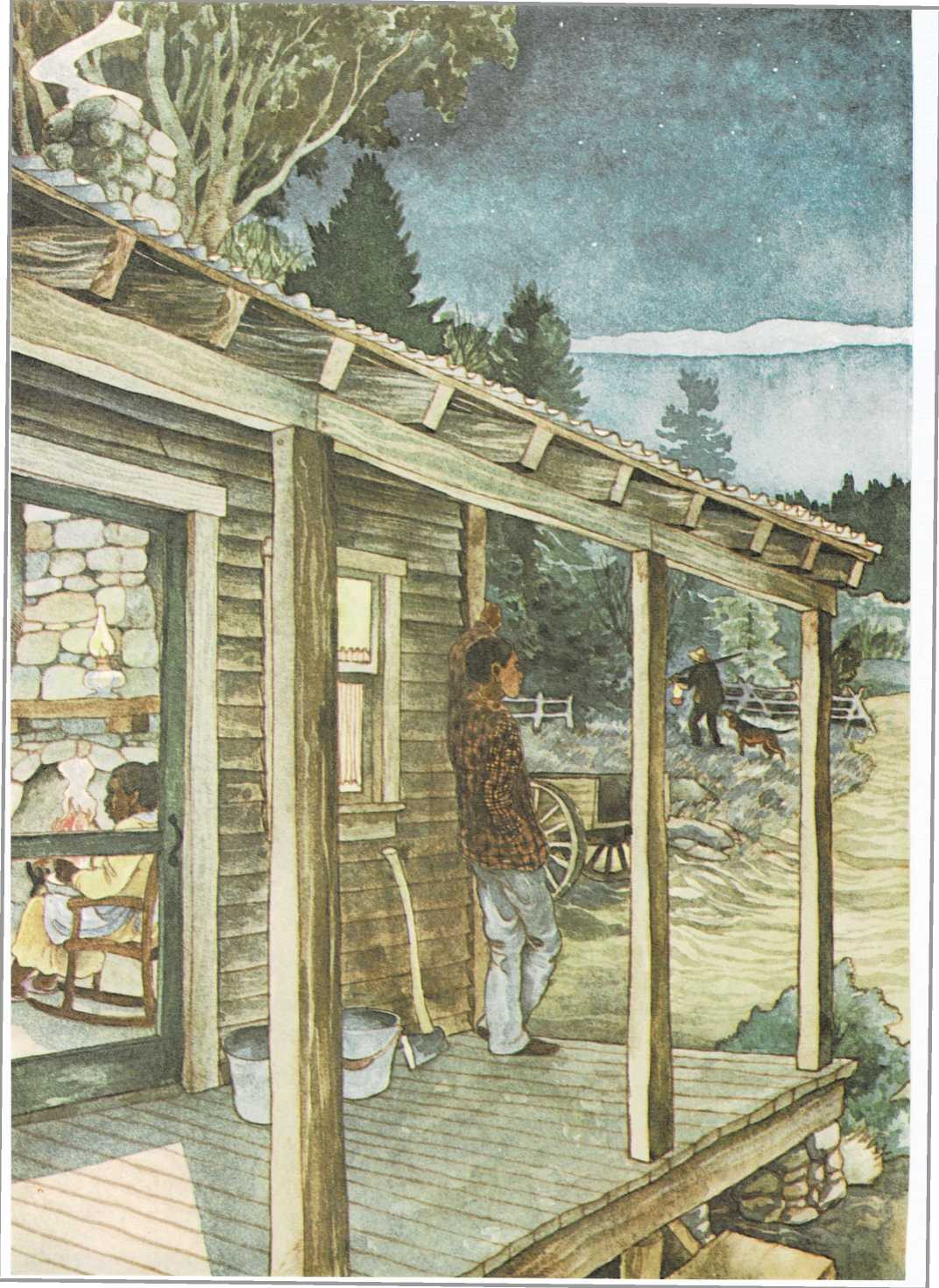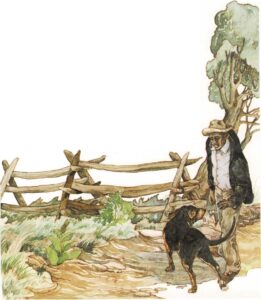
\
Stories
The Homecoming
from Sounder
by William H. Armstrong
Sounder, a fine coon dog, was shot when the sheriff arrested his master.
His wounds have healed, but he is badly crippled. With the care of the
boy—his master’s son—and the boy’s mother, he has lived for many
years. But he can’t forget his master, who has never returned.
Late one August afternoon the boy and his mother sat on the shaded
corner of the porch. The heat and drought of dog days had parched the
earth, and the crops had been laid by. The boy had come home early
because there was nothing to do in the fields.
“Dog days is a terrible time,” the woman said. “It’s when the heat is so
bad the dogs go mad.” The boy would not tell her that the teacher had
told him that

dog days got their name from the Dog Star because it rose and set with
the sun during that period. She had her own feeling for the earth, he
thought, and he would not confuse it.
“It sure is hot,” he said instead. “Lucky to come from the fields
early.” He watched the heat waves as they made the earth look like it
was moving in little ripples.
Sounder came around the corner of the cabin from somewhere, hobbled back
and forth as far as the road several times, and then went to his cool
spot under the porch. “That’s what I say about dog days,” the woman
said. “Poor creature’s been addled with the heat for three days. Can’t
find no place to quiet down. Been down the road nearly out o’ sight a
second time today, and now he musta come from the fencerows. Whines all
the time. A mad dog is a fearful sight. Slobberin’ at the mouth and
runnin’ every which way ’cause they’re blind. Have to shoot ’em ‘fore
they bite some child. It’s awful hard.”
“Sounder won’t go mad,” the boy said. “He’s lookin’ for a cooler spot, I
reckon.”
A lone figure came on the landscape as a speck and slowly grew into a
ripply form through the heat waves. “Scorchin’ to be walkin’ and totin’
far today,” she said as she pointed to the figure on the road.
A catbird fussed in the wilted lilac at the corner of the cabin. “Why’s
that bird fussin’ when no cat’s prowlin’? Old folks has a sayin’ that if
a catbird fusses ’bout nothin’, somethin’ bad is cornin’. It’s a bad
sign.”
“Sounder, I reckon,” the boy said. “He just passed her bush when he came
around the cabin.”
In the tall locust at the edge of the fence, its top leaves yellowed
from lack of water, a mockingbird mimicked the catbird with half a dozen
notes, decided it was too hot to sing, and disappeared. The great coon
dog, whose rhythmic panting came through the porch floor, came from
under the house and began to whine.
As the figure on the road drew near, it took shape and grew indistinct
again in the wavering heat. Sometimes it seemed to be a person dragging
something, for little puffs of red dust rose in sulfurous clouds at
every other step. Once or twice they thought it might be a brown cow or
mule, dragging its hooves in the sand and raising and lowering its weary
head.
Sounder panted faster, wagged his tail, whined, moved from the dooryard
to the porch and back to the dooryard.
The figure came closer. Now it appeared to be a child carrying something
on its back and limping.
“The children still at the creek?” she asked.
“Yes, but it’s about dry.”
Suddenly the voice of the great coon hound broke the sultry August
deadness. The dog dashed along the road, leaving three-pointed clouds of
red dust to settle back to earth behind him. The mighty voice rolled out
upon the valley, each flutelike bark echoing from slope to slope.
“Lord’s mercy! Dog days done made him mad.” And the rocker was still.
Sounder was a young dog again. His voice was the same mellow sound that
had ridden the November breeze from the lowlands to the hills. The boy
and his mother looked at each other. The catbird stopped her fussing in
the wilted lilac bush. On three legs, the dog moved with the same
lightning speed that had carried him to the throat of a grounded
raccoon.
Sounder’s master had come home. Taking what might have been measured as
a halting half step and
then pulling a stiff, dead leg forward, dragging a foot turned sideways
in the dust, the man limped into the yard. Sounder seemed to understand
that to jump up and put his paw against his master’s breast would topple
him into the dust, so the great dog smelled and
whined and wagged his tail and licked the limp hand dangling at his
master’s side. He hopped wildly around his master in a circle that
almost brought head and tail together.
The head of the man was pulled to the side where a limp arm dangled and
where the foot pointed outward as it was dragged through the dust. What
had been a shoulder was now pushed up and back to make a one-sided hump
so high that the leaning head seemed to rest upon it. The mouth was
askew too, and the voice came out of the part farthest away from the
withered, wrinkled, lifeless side.
The woman in the still rocker said, “Lord, Lord,” and sat suffocated in
shock.
“Sounder knew it was you just like you was cornin’ home from work,” the
boy said in a clear voice.
Half the voice of the man was gone too, so in slow,

measured, stuttering he told how he had been caught in a dynamite blast
in the prison quarry, how the dead side had been crushed under an
avalanche of limestone, and how he had been missed for a whole night in
the search for dead and wounded. He told how the pain of the crushing
stone had stopped in the night, how doctors had pushed and pulled and
encased the numb side of his body in a cast, how they had spoken kindly
to him and told him he would die. But he resolved he would not die, even
with a half-dead body, because he wanted to come home again.
“For being hurt, they let me have time off my sentence,” the man said,
“and since I couldn’t work, I guess they was glad to.”
“The Lord has brought you home,” the woman said.
The boy heard faint laughter somewhere behind the cabin. The children
were coming home from the creek. He went around the cabin slowly, then
hurried to meet them.
“Pa’s home,” he said and grabbed his sister, who had started to run
toward the cabin. “Wait. He’s mighty crippled up, so behave like nothin’
has happened.”
“Can he walk?” the youngest child asked.
“Yes! And don’t you ask no questions.”
“You been mighty natural and considerate,” the mother said to the
younger children later when she went to the woodpile and called them to
pick dry kindling for a quick fire. When she came back to the porch she
said, “We was gonna just have a cold piece ’cause it’s so sultry, but
now I think I’ll cook.” Everything don’t change much, the boy thought.
There’s eatin’ and sleepin’ and talkin’ and settin’ that goes on. One
day might be different from another, but there ain’t much difference
when they’re put together.
Sometimes there were long quiet spells. Once or twice the boy’s mother
said to the boy, “He’s powerful proud of your learnin’. Read somethin’
from the
Scriptures.” But mostly they just talked about heat and cold, and wind
and clouds, and what’s gonna be done, and time passing.
As the days of August passed and September brought signs of autumn, the
crippled man sat on the porch step and leaned the paralyzed, deformed
side of his body against a porch post. This was the only comfortable
sitting position he could find. The old coon dog would lie facing his
master, with his one eye fixed and his one ear raised. Sometimes he
would tap his tail against the earth. Sometimes the ear would droop and
the eye would close. Then the great muscles would flex in dreams of the
hunt, and the mighty chest would give off a muffled whisper of a bark.
Sometimes the two limped together to the edge of the fields, or wandered
off into the pine woods. They never went along the road. Perhaps they
knew how strange a picture they made when they walked together.
About the middle of September the boy left to go back to his teacher.
“It’s the most important thing,” his mother said.
And the crippled man said, “We’re fine. We won’t need nothin’.”
“I’ll come for a few days before it’s cold to help gather wood and
walnuts.”
The broken body of the old man withered more and more, but when the
smell of harvest and the hunt came with October, his spirit seemed to
quicken his dragging step. One day he cleaned the dusty lantern globe,
and the old dog, remembering, bounced on his three legs and wagged his
tail as if to say “I’m ready.”
The boy had come home. To gather the felled trees and chop the standing
dead ones was part of the field pay too. He had been cutting and
dragging timber all day.
Sometimes he had looked longingly at the lantern and possum sack, but
something inside him had said


“Wait. Wait and go together.” But the boy did not want to go hunting
anymore. And without his saying anything, his father had said, “You’re
too tired, child. We ain’t goin’ far, no way.”
In the early darkness the halting, hesitant swing of the lantern marked
the slow path from fields to pine woods toward the lowlands. The boy
stood on the porch, watching until the light was lost behind pine
branches. Then he went and sat by the stove. His mother rocked as the
mound of kernels grew in the fold of her apron. “He been mighty peart,”
she said. “I hope he don’t fall in the dark. Maybe he’ll be happy now he
can go hunting again.” And she took up her singing where she had left
off.
Ain’t nobody else gonna walk it for you, You gotta walk it by
yourself.
Sounder, his master, the boy, and the boy’s mother all have the kind of
courage it takes to live through long, hard years. And that courage
helps to bring about some very important changes in the boy’s life. To
find out what they are, read Sounder. You’ll meet a very different
kind of dog in Good-Bye, My Lady by James Street. The “lady” washes
herself like a cat, laughs like a child, and becomes a most unusual
friend for Skeeter, the boy who finds her.

This be the verse you grave for me: *Here he lies where he longed to
be; Home is the sailor, home from sea, And the hunter home from the
hill.Requiem
by Robert Louis Stevenson
Under the wide and starry sky Dig the grave and let me lie. Glad did I
live and gladly die, And I laid me down with a will.

